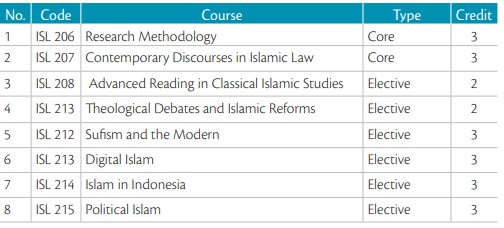MA in Islamic Studies
MA in Islamic Studies
The faculty of Islamic Studies at UIII offers a Master's program (MA) for the academic year of 2022-2023. The program is designed to produce experts in Islamic studies, who are able to critically combine Islamic sciences with classical and contemporary approaches through interdisciplinary, multidisciplinary, and transdisciplinary perspectives with a focus on Islam and Muslim societies. Students are encouraged to critically engage with the diversity of academic knowledge constructions and to creatively dialogue these constructions with the changing reality to produce creative and critical thinking. The program employs a critical and analytical approach to the study of Islam and Muslim societies. It is designed to open professional development pathways for those working in academic institutions. It is also intended to serve as a platform for future scholars in Islamic studies to explore diverse discourses and practices that have developed in Islam in order to see their subjectivity vis-à-vis universal Islamic values and thus apply the broad knowledge to praxis.
Expected Learning Outcomes/Competency of MA in Islamic Studies
Upon the program completion, students are expected to:
- Understand basic issues in the development of scholarship on Islam and Muslim societies by critically examining the foundational and non-foundational sources of Islam.
- Understand the interconnectivity between major canonical texts both in classical and contemporary scholarship and the contexts in which the texts are interpreted and translated into a variety of forms.
- Build critical analyses of how basic issues on Islam and Muslim societies are translated into a wide variety of institutions.
- Build skills to communicate their critical understanding of Islam to a variety of audiences.
- Apply research methods and contemporary
Degree Requirements
To qualify for the M.A. degree, students must complete 42 credits. The credits include core and elective courses, an independent project on Islam and Muslim societies, a journal article publication, and a thesis. The program is offered on a full-time (24 months, over four-semester) basis.
Course Structure
The program offers courses that examine the sources and origins of Islamic thought and practice, in particular the foundational texts in Islam, together with a knowledge and understanding of the history and Islamic civilization. In addition, it offers a wide range of optional modules that will prepare students to contextualize Islamic Studies and be able to critically analyze contemporary debates and issues concerning Islam and Muslims. The taught modules are delivered through a model of blended learning, which combines traditional class-based methods and guided independent study with online learning. Lectures, tutorials, seminars, occasional workshops, peer group learning (such as delivering presentations to the class), journal article publication, and independent study are incorporated into the program. The thesis allows students to choose their own area of interest as a focus for research.
During the program’s four semesters, students must complete a total of 42 credits, consisting of:
- 12 credit foundation courses
- 9 credit core courses
- 6 credit electives courses
- 3 credit independent project
- 3 credit proposal seminar
- 3 credit journal article publication
- 6 credit thesis
Courses are grouped into four components:
- Intensive reading of the foundational texts and discourses in Islam
- Historical and Contemporary Muslim context
- Theoretical perspectives to understanding Islam and Muslim Society
- Research methodology and skill
Semester 1 (15 Credits)

Semester 2 (12 Credits)

Semester 3 (9 Credits)

Semester 4 (6 Credits)
